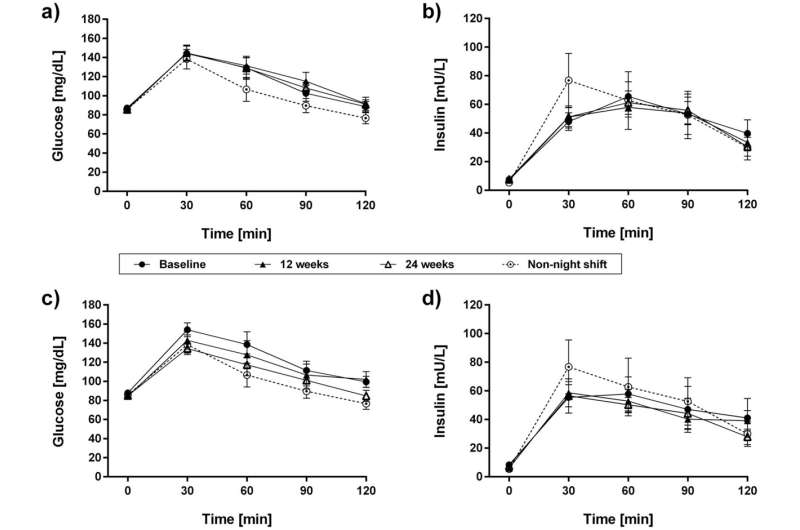This article has been reviewed according to Science X's editorial process and policies. Editors have highlighted the following attributes while ensuring the content's credibility:
fact-checked
trusted source
proofread
Insulin resistance in shift workers not affected by melatonin treatment, finds study

Melatonin treatment does not affect the insulin resistance or the glucose tolerance of night shift workers, according to a new study from the University of Surrey and the University Medical Centre Hamburg. Melatonin treatment does, however, significantly improve the sleep quality of those working shifts.
In this study, scientists explored how oral melatonin affects insulin resistance and blood pressure in night shift workers, who face a higher risk of type 2 diabetes. Insulin resistance is when cells struggle to absorb glucose from the blood. Previous research suggests melatonin could help these workers' glucose tolerance and heart health. This led scientists to investigate melatonin's broader effects on the body.
Professor Debra Skene, professor of neuroendocrinology at the University of Surrey, said, "Night shift work is necessary for our emergency and health services and to keep our economy moving. However, working night shifts disrupts our circadian rhythms, which are driven by light/dark cycles and are associated with sleep disturbances, cardiometabolic diseases, and increased risk of diabetes."
"We need to find ways to limit the adverse health implications for night shift workers so they can continue in their roles while protecting their long-term health."
To investigate the impact of melatonin, 24 night shift workers and 12 healthy non-shift workers were recruited and underwent glucose tolerance testing and blood pressure monitoring for 24 hours. Night shift workers were then randomized to receive oral melatonin (2 mg) or a placebo at night time or in the morning, depending on their shift schedule, for 12 weeks.
The authors identified that night shift workers were significantly more insulin-resistant than non-night shift workers. After 12 weeks of taking the hormone melatonin, no significant effect was observed in serum glucose or insulin concentrations, which are markers of insulin resistance. Similarly, for blood pressure, treatment with melatonin had no significant effect.
Unsurprisingly, melatonin significantly improved the sleep quality of night shift workers. During the initial assessment, only 21 percent of night shift workers described their sleep quality as good; however, after 12 weeks of melatonin treatment, 50 percent of this cohort indicated good sleep quality. The proportion of good versus poor sleepers remained almost unchanged in the placebo group.
Professor Skene added, "The benefits of improved sleep for shift workers via melatonin are undeniable, and people should feel more rested and alert. However, since there is no evidence that the use of melatonin reduces insulin resistance, we need to find alternate ways to improve insulin resistance and lessen the likelihood of a person developing type 2 diabetes."
This study was published in the journal Pharmacological Research.
More information: Juliane Hannemann et al, Effect of oral melatonin treatment on insulin resistance and diurnal blood pressure variability in night shift workers. A double-blind, randomized, placebo-controlled study, Pharmacological Research (2023). DOI: 10.1016/j.phrs.2023.107011




















